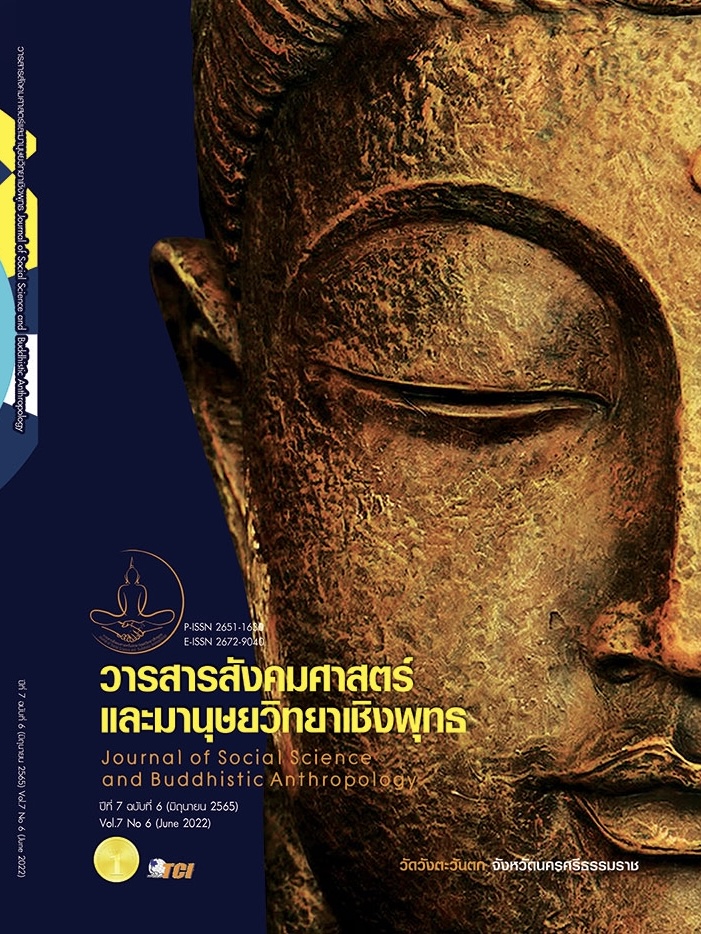DEVELOPMENT OF AN EVALUATION MODEL FOR PROFESSIONAL COMPETENCY STANDARD OF LECTURER IN AVIATION BUSINESS PROGRAM UNDER HIGHER EDUCATION INSTITUTION
Keywords:
Evaluation Model, Professional Competency, Aviation business, Higher education InstitutionAbstract
The Objectives of this research article were to develop and evaluate the effectiveness of the evaluation model for the professional competency standard of lecturer in aviation business program under higher education institution. It was mixed-method research with two research phases. Phase 1 was to develop the evaluation model; step 1 was to draft an evaluation model using in-depth interviews with 8 experts. The research tool was an in-depth interview question, and data was analyzed through frequency and content analysis. Step 2 was to examine the preliminary quality of the evaluation model through the focus group technique with 7 experts. The research tools were questions for the focus group and the preliminary quality of the evaluation model form. The data was analyzed by frequency, percentage, mean, standard deviation, and content analysis. Phase 2 was to assess the effectiveness of the evaluation model that was experimented in a higher education institution that provides teaching and learning in the aviation business program. The participants included 11 teachers and 166 students. The research tools were: 1) the evaluation model; 2) the assessment guide; and 3) an in-depth interview question. The data was analyzed through frequency, percentage, mean, standard deviation, and content analysis. The findings indicated that: 1) The evaluation model consisted of 4 components: assessment goals, professional competency standards, assessment methods and tools, and feedback. The evaluation model had a utility, feasibility, and propriety standard at the highest level while the accuracy standard was at a high level. 2) The effectiveness of the evaluation model was found that the evaluation model was effective in terms of utility to provide the development guidelines for professional competence, the guidelines for supporting lecturers, the evaluation results may be used in other fields; the assessment results were empirically valid, and the participants were satisfied with the evaluation model at the highest level.
References
กระทรวงศึกษาธิการ. (2558). ประกาศกระทรวงศึกษาธิการ เรื่องเกณฑ์มาตรฐานหลักสูตรระดับปริญญาตรี พ.ศ. 2558. เรียกใช้เมื่อ 16 กันยายน 2561 จาก http://www.oreg. rmutt.ac.th/AMS/BCH_2548.pdf
การประปาส่วนภูมิภาค. (2560). โครงการวิเคราะห์สมรรถนะความสามารถของพนักงานเพื่อการบริหารและการพัฒนาทรัพยากรมนุษย์. เรียกใช้เมื่อ 16 กันยายน 2561 จาก http://hrm.pwa.co.th/uploads/article/file/20080930134428.pdf
จินตนา ไพบูลย์ธนานนท์. (2551). การพัฒนารูปแบบประเมินสมรรถนะพยาบาลเวชปฏิบัติทางตา. ใน ดุษฎีนิพนธ์ปรัชญาดุษฎีบัณฑิต สาขาการพัฒนาทรัพยากรมนุษย์. มหาวิทยาลัยรามคำแหง.
ชนะ กสิภาร์. (2555). มาตรฐานอาชีพ เอกสารประกอบการใช้ทดลองประเมินสมรรถนะวิชาชีพบุคลากรตามระบบคุณวุฒิวิชาชีพ. เรียกใช้เมื่อ 16 กันยายน 2561 จาก http://thaivq.org.
ชวนนท์ จันทร์สุข. (2559). การพัฒนารูปแบบประเมินสมรรถนะด้านการดูแลอย่าเอื้ออาทรของนักศึกษาพยาบาล วิทยาลัยพยาบาล สังกัดสถาบันพระบรมชนก. วารสารการพยาบาลและการศึกษา, 10(2), 71-78.
บุญชม ศรีสะอาด. (2545). การวิจัยเบื้องต้น. กรุงเทพมหานคร: สุวีริยาสาส์น.
บุญศรี พรหมมาพันธ์. (2557). การวิเคราะห์ข้อมูลและการเขียนรายงานการประเมิน ใน สาขาวิชาศึกษา ศาสตร์ มหาวิทยาลัยสุโขทัยธรรมาธิราช, เอกสารการสอน ชุดวิชา วิธีวิทยาการประเมินทางการศึกษา หน่วยที่ 6. (พิมพ์ครั้งที่ 2). นนทบุรี: มหาวิทยาลัยสุโขทัยธรรมาธิราช.
ปาริฉัตร อุทัยพันธ์. (2553). การพัฒนารูปแบบประเมินสมรรถนะที่พึงประสงค์ของนักศึกษาเทคนิคเภสัชกรรม วิทยาลัยสาธารณสุขสิรินธร สังกัดสถาบันพระบรมราชชนก. ในดุษฎีนิพนธ์ปรัชญาดุษฎีบัณฑิต สาขาการประเมินการศึกษา. มหาวิทยาลัยสุโขทัยธรรมาธิราช.
ปิยะพงศ์ กู้พงศ์พันธ์. (2561). รูปแบบการประเมินสมรรถนะผู้ตัดสินกีฬาแบดมินตัน. ใน ดุษฎีนิพนธ์ปรัชญาดุษฎีบัณฑิต สาขาวิทยาศาสตร์การออกกำลังกายและกีฬา. มหาวิทยาลัยบูรพา.
พระราชบัญญัติการศึกษาแห่งชาติ (ฉบับที่ 2). (2561). เรื่อง มาตรฐานการอุดมศึกษา พ.ศ.2561. ราชกิจจานุเบกษา เล่มที่ 135 ตอนพิเศษ 199 ง หน้า19 (17 สิงหาคม 2561).
ลัฐกา เนตรทัศน์. (2562). การส่งเสริมให้ประเทศไทยเป็นศูนย์กลางการบินของอาเซียนฝ่ายอาเซียนและกิจการต่างประเทศ กองกฎหมายต่างประเทศ สำนักงานคณะกรรมการกฤษฎีกา. เรียกใช้เมื่อ 16 มกราคม 2563 จาก https://lawforasean. krisdika.go. th/File/files/Article_May2_AviationHub.pdf
ศรายุทธ รัตนปัญญา. (2557). การพัฒนารูปแบบการประเมินสมรรถนะโดยประยุกต์ใช้การประเมินแบบเสริมพลังอำนาจสำหรับผู้บริหารสถานศึกษาใหม่ สังกัดสำนักงานคณะกรรมการการศึกษาขั้นพื้นฐาน. ใน ดุษฎีนิพนธ์ปรัชญาดุษฎีบัณฑิต สาขาการประเมินการศึกษา. มหาวิทยาลัยสุโขทัยธรรมาธิราช.
ศิริชัย กาญจนวาสี. (2550). ทฤษฎีการประเมิน. (พิมพ์ครั้งที่ 6). กรุงเทพมหานคร: สำนักพิมพ์แห่งจุฬาลงกรณ.
สุเทพ เมยไธสง. (2564). การศึกษาองค์ประกอบและตัวบ่งชี้ของการบริหารจัดการเชิงรุกโรงเรียนผู้สูงอายุเพื่อสร้างภูมิคุ้มกันทางใจและประสิทธิผลของโรงเรียน. วารสารสังคมศาสตร์และมานุษยวิทยาเชิงพุทธ, 7(3), 33-47.
อรวรรณ สัมภวมานะ. (2554). การพัฒนารูปแบบประเมินสมรรถนะพยาบาลวิชาชีพหน่วยบริการปฐมภูมิ. ใน ศึกษาศาสตร์ดุษฎีบัณฑิต สาขาการวิจัยและพัฒนาการศึกษา. มหาวิทยาลัยเชียงใหม่.
American Institutes for Research. (2016). Eight Key Components of Teacher Evaluation Models. Retrieved December 16, 2019, from http://resource. tqsource.org/ evalmodel/
Maaleki, A. (2018). The arzesh competency model: appraisal & development manager’s competency model. London: Lambert Academic Publishing.
World Tourism Organization. (2019). 2019Madrid. Madrid: UNWTO.
Zeravikova, I. et al. (2015). The analysis of professional competencies of a lecturer in adult education. Retrieved March 3, 2020, from http://www.ncbi. nlm.nih.gov/pmc/articles/PMC4456596/
Downloads
Published
How to Cite
Issue
Section
License
Copyright (c) 2022 Journal of Social Science and Buddhistic Anthropology

This work is licensed under a Creative Commons Attribution-NonCommercial-NoDerivatives 4.0 International License.









